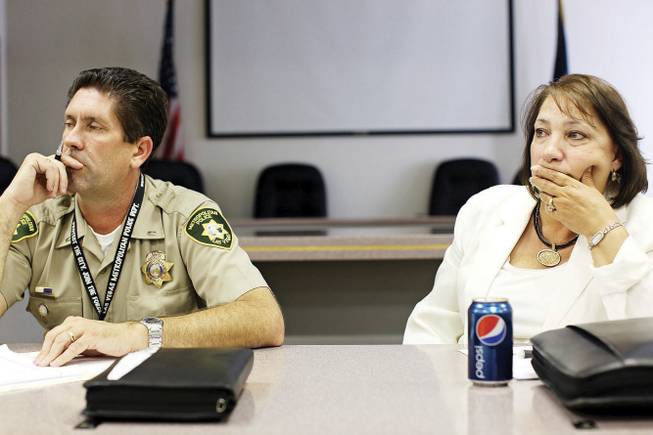
Metro Police Lt. Frank Reagan and Janelle Kraft Pearce, a retired Metro official, lead a meeting of the Southern Nevada Mental Health Coalition on Thursday in Las Vegas.
Monday, June 8, 2009 | 2 a.m.
Sun Coverage
Sun Archives
- New plan could shorten ER waits (7-31-2008)
- A chance at a real life (1-29-2008)
- No longer under the radar (3-25-2005)
- Crisis continues for mentally ill patients (8-25-2004)
- Plan for mental patients approved (10-30-2002)
- Plan for mentally ill is questioned (8-19-2002)
On Thursday, nearly one-third of the patients in Las Vegas Valley emergency rooms were awaiting psychiatric care.
That morning’s tally — 117 people whose minds had unraveled to a point where they were considered a danger to themselves or others — was higher than the number cited when Clark County declared a mental health emergency in 2004. The resurgence has health care officials concerned that the stress of the economic collapse could be fueling another communitywide psychiatric crisis.
A coalition formed to address the issue five years ago stopped meeting in 2007. But its members regrouped Thursday to try, once again, to reconcile an increasing demand for psychiatric care with a dwindling supply.
“There are more people in crisis, we still have overcrowding and a lack of services, bringing us kind of back to square one,” said Janelle Kraft Pearce, a retired Metro Police official and chairwoman of the Southern Nevada Mental Health Coalition.
She was speaking to a group that included directors of hospital emergency rooms, psychiatrists, drug and alcohol abuse counselors, and state mental health officials. Many of them had come together in years past to talk about the same problem.
It starts with a Nevada law that requires every person seeking psychiatric care from the state to get a physical examination first. But the state’s mental health campus doesn’t have the resources to perform those exams, so the patients wind up in hospital emergency rooms. And because the state has a limited number of beds, the patients wind up waiting in emergency rooms — currently, for 2 1/2 days on average.
The more psychiatric patients, the worse the problem, particularly when so many of them are deemed dangerous.
Their warehousing at the valley’s 15 hospitals is not good for those patients, the hospitals or other people who need emergency medical care, officials at the meeting said.
They also allowed that an immediate solution remains elusive.
When then-Clark County Manager Thom Reilly declared an emergency in July 2004, 104 psychiatric patients filled the valley’s hospitals. The coalition and others prepared a number of proposals to address the issue, including seeking about $13 million from the state for building a separate triage center where patients could get physical and psychiatric evaluations in the same place. But that proposal failed in the most recent legislative session, another victim of the economy.
Unfortunately, the same collapse appears to be taking its toll on the mental health of people across the valley, officials said.
“The combined stresses are causing people to become distraught,” said Stuart J. Ghertner, agency director at Southern Nevada Adult Mental Health Services. Ghertner, who was at Thursday’s meeting, oversees outpatient care at the state’s Las Vegas campus, at 6161 W. Charleston Blvd. He has seen as many as 1,000 patients seeking outpatient help in recent months, twice as many as a year ago.
“The economy is playing a role. People are losing jobs, health insurance, homes,” Ghertner said.
The resulting psychological chaos is what Lesley R. Dickson, past president of the Nevada Psychiatric Association, called “the domino effect of losing jobs.”
Dickson, who was also at the coalition meeting, noted that some of the patients crowding hospital emergency rooms probably are there because they had stopped taking their medication, a result of losing health insurance.
Jim Osti, administrative analyst at the Southern Nevada Health District, said the number of hospital emergency rooms had increased by three since 2004, and the number of beds at the state campus had more than doubled to about 230 — but those amounts still don’t meet the need. Not only that, most of the private and public agencies represented in the room had taken steps backward recently because of the economy. Southern Nevada Adult Mental Health Services, for example, is losing four psychiatrists next month, reducing Ghertner’s staff from 22 to 18, even while the number of patients continues to increase.
The coalition will continue meeting in the coming months, at the least to share information and ideas for making wiser use of the resources that do exist. But the frustration was evident Thursday.
“The thing is, everybody knows the solution — a single facility for medical clearance and psychiatric evaluation,” Ghertner said. “And this community has been unable to make this happen.”

Join the Discussion:
Check this out for a full explanation of our conversion to the LiveFyre commenting system and instructions on how to sign up for an account.
Full comments policy